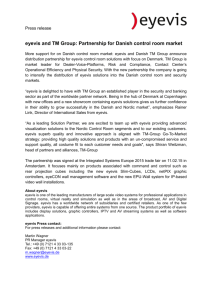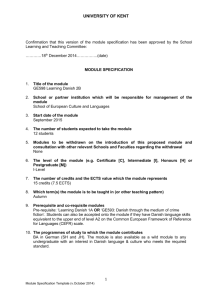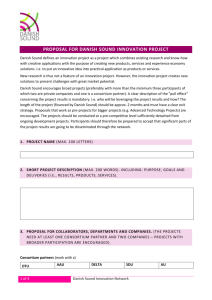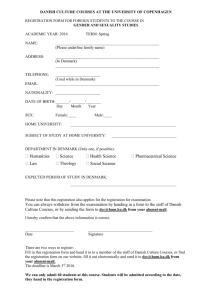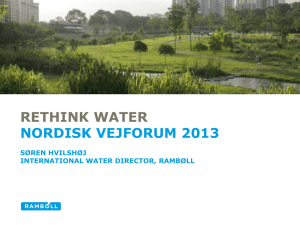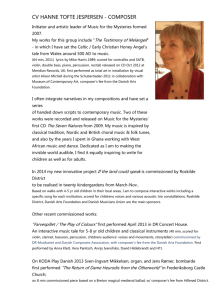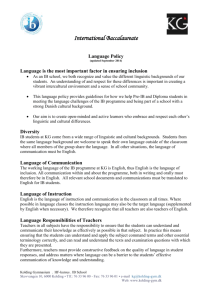University of Kent
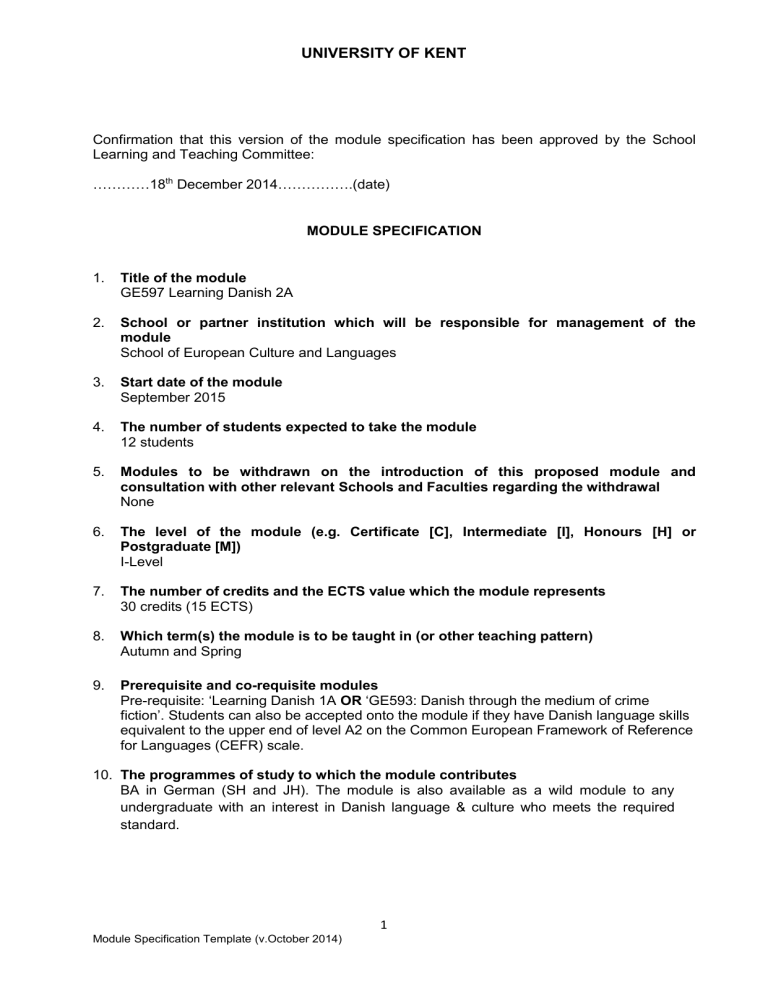
UNIVERSITY OF KENT
Confirmation that this version of the module specification has been approved by the School
Learning and Teaching Committee:
…………18 th December 2014 …………….(date)
MODULE SPECIFICATION
1. Title of the module
GE597 Learning Danish 2A
2. School or partner institution which will be responsible for management of the module
School of European Culture and Languages
3. Start date of the module
September 2015
4. The number of students expected to take the module
12 students
5. Modules to be withdrawn on the introduction of this proposed module and consultation with other relevant Schools and Faculties regarding the withdrawal
None
6. The level of the module (e.g. Certificate [C], Intermediate [I], Honours [H] or
Postgraduate [M])
I-Level
7. The number of credits and the ECTS value which the module represents
30 credits (15 ECTS)
8. Which term(s) the module is to be taught in (or other teaching pattern)
Autumn and Spring
9. Prerequisite and co-requisite modules
Prerequisite: ‘Learning Danish 1A OR ‘GE593: Danish through the medium of crime fiction’. Students can also be accepted onto the module if they have Danish language skills equivalent to the upper end of level A2 on the Common European Framework of Reference for Languages (CEFR) scale.
10. The programmes of study to which the module contributes
BA in German (SH and JH). The module is also available as a wild module to any undergraduate with an interest in Danish language & culture who meets the required standard.
1
Module Specification Template (v.October 2014)
UNIVERSITY OF KENT
11. The intended subject specific learning outcomes
On successful completion of this module , students will be able to demonstrate proficiency in the Danish language equivalent to the upper end of level B1 on the CEFR scale.
11.1. Listening
11.2. Reading
11.3. Speaking
11.4. Writing
11.5. Grammar
Students can understand factual information about everyday, job- and university-related topics and identify both general and specific details.
Students can read longer factual and fictional texts but still require some help from a dictionary.
Students can communicate confidently on familiar matters and can give their opinion on a story, a film or a societal topic. Students can also answer further questions without being prepared.
Students can describe events and experiences with a high degree of detail. Students can also express opinions on and reactions to – for example – a book or a film and communicate these with confidence.
Students can communicate with reasonable accuracy in familiar contexts and use a wide range of both simple and more complex automatized structures and phrases.
Students are for example confident in using all tenses also of the most frequent irregular verbs, and master inversion also in sub-clauses.
11.6. Pronunciation Students can pronounce all Danish sounds with confidence.
Pronunciation is clearly intelligible even if a foreign accent is sometimes evident.
12. The intended generic learning outcomes
On successful completion of this module, students will be able to
12.1. Independently identify knowledge gaps and are able to use appropriate, advanced resources (including online tools) to fill these.
12.2. Manage workload and organise their time efficiently.
12.3. Transfer their skills of writing cogent, well-structured text and developing arguments when writing in other languages, including their mother tongue.
12.4. Participate in conversation and discussion, listening to, respecting and complementing the contributions of others.
12.5. Use strategies for paraphrasing and circumlocution.
12.6. Reflect on the target culture and their own culture in an intercultural context.
13. A synopsis of the curriculum
This module is a follow-up module, which builds on the knowledge of Danish language and culture acquired in Learning Danish 1A. It consolidates students’ existing competences in the four main language-learning areas: reading, writing, speaking and listening. The language teaching will be delivered communicatively and will introduce increasingly complex Danish grammar, syntactical structures, semantic specificities and pronunciation subtleties. Topics will relate closely to students’ everyday life as university students and purpose-made material will enable students to participate in conversations about their study area, working methods, life on campus, sport and leisure activities.
This module wil l further develop students’ knowledge of university life in Denmark, aiming to provide a grounding in Danish academic culture (whether they eventually go on a year abroad in Denmark or not). Topics will also include topics on the Danish political system, the welfare state, the Danish national church etc.
2
Module Specification Template (v.October 2014)
UNIVERSITY OF KENT
14. Indicative Reading List
Garde, Anna. 2011. Danish Dictionary: Danish-English, English-Danish . (Routledge
Bilingual Dictionaries) or equivalent.
Langaard, Birte. 2011. Pæredansk (Copenhagen: Gyldendal)
Lundskær-Nielsen, Tom, and Philip Holmes. 2011. Danish: An Essential Grammar
(London: Routledge)
A high quantity of purpose-produced materials will form the basis of the module’s resources. These will be made available to students via the Moodle page. In addition, online (text, audio and video) material will be used ( Online dansk , Dansk på arbejde and
Nyidanmark ).
15. Learning and Teaching Methods, including the nature and number of contact hours and the total study hours which will be expected of students, and how these relate to achievement of the intended module learning outcomes
This module will be taught by means of 3 hours of seminars and a 1-hour conversation workshop for twenty weeks, which amount to 80 total contact hours.
Seminar hours: 60 hours
Conversation hours:
Independent study hours:
Total study hours:
20 hours
220 hours
300 hours
The seminar hours will be in small seminar groups to allow for close involvement and interaction. These will combine individual, pair and group work, which will develop speaking, reading, listening and writing skills (11.1-11.6, with lesser focus on 11.1,11.3;
12.1-12.6). There will be language homework (11.1-11.2, 11.4-11.5, 12.1-12.6) and regular formative written assessments throughout the two terms. (11.4-11.5, 12.1-12.3).
Students will be highly encouraged to form study groups in which they can practise vocabulary, communicate in Danish, develop understanding of grammar, etc. (11.1-
11.6, 12.1-12.2, 12.4-12.6i). The weekly conversation hour focuses solely on oral understanding and production (11.1, 11.3, 11.6, 12.1, 12.4 and 12.6).
16. Assessment methods and how these relate to testing achievement of the intended module learning outcomes
This module will be assessed by 100% coursework consisting of:
Term 1:
A) 1 oral test (10 minutes, 10%)
Testing learning outcomes 11.1, 11.3, 11.5, 11.6., 12.4-12.6.
B) 4 written take-home assignments of approximately 150 words (4x2.5% = 10%).
Testing learning outcomes 11.4-11.5, 12.1, 12.3 and 12.5-12.6.
C) 1 in-class listening test (15 minutes, 10%)
Testing learning outcomes 11.1, 11.4, 12.2.
D) 1 in-class written test (1 hour, 20%)
Testing learning outcomes 11.2, 11.4-11.5, 12.2-12.3 and 12.5-12.6.
Term 2:
E) 2 written take-home assignments of approximately 300 word (2x5% = 10%)
Testing learning outcomes 11.4-11.5, 12.1, 12.3 and 12.5-12.6.
F) 1 oral test (15 minutes, 20%)
3
Module Specification Template (v.October 2014)
UNIVERSITY OF KENT
Testing learning outcomes 11.1, 11.3, 11.5, 11.6., 12.4-12.6.
G) 1 in-class written test (2 hours, 20%)
Testing learning outcomes 11.2, 11.4-11.5, 12.2-12.3 and 12.5-12.6.
17. Implications for learning resources, including staff, library, IT and space
A part-time member of staff may be needed to teach this module.
18. The School recognises and has embedded the expectations of current disability equality legislation, and supports students with a declared disability or special educational need in its teaching. Within this module we will make reasonable adjustments wherever necessary, including additional or substitute materials, teaching modes or assessment methods for students who have declared and discussed their learning support needs. Arrangements for students with declared disabilities will be made on an individual basis, in consultation with the University’s disability/dyslexia support service, and specialist support will be provided where
needed.
19. Campus(es) or Centre(s) where module will be delivered:
Canterbury.
Module Specification Template (v.October 2014)
4
